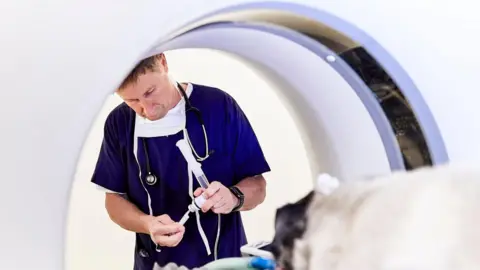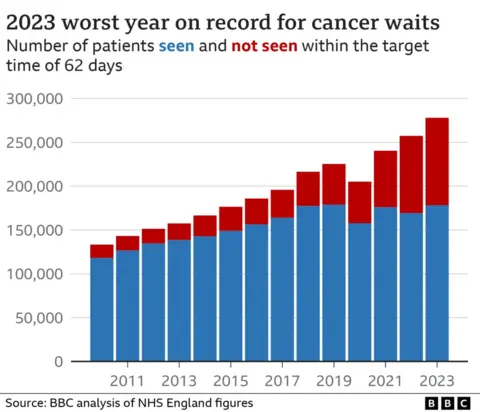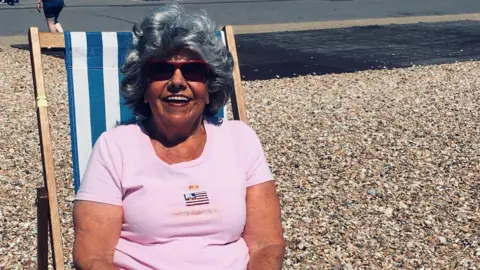ARTICLE AD BOX

 Getty Images
Getty Images
Long waits for cancer care are becoming routine across the UK with nearly half of all specialist cancer centres experiencing delays most weeks, the Royal College of Radiologists (RCR) has said.
The college has warned of an “impending crisis” in the cancer workforce, with a “staggering” 30% shortfall in radiologists and 15% shortfall in clinical oncologists.
The Conservative Party said it would meet current targets for cancer care in England by the end of the next parliament, if re-elected.
Labour has said it will double the number of scanners to improve early detection, while the Liberal Democrats said they would introduce a legal guarantee for all patients to start treatment within 62 days of an urgent referral in England.
'Not enough doctors'
The RCR report was based on responses from senior managers at 60 specialist cancer centres in England, Wales, Scotland and Northern Ireland.
The survey, carried out in November 2023, found the number of centres experiencing severe delays had almost doubled in a year.
Managers at 47% of sites said patients needing chemotherapy and other cancer drugs were facing delays “most weeks or every week”, up from reports of delays at 28% of sites the previous year.
Centres reporting weekly delays to radiotherapy also nearly doubled, from 22% in 2022 to 43% in 2023.
Almost all clinical directors surveyed said workforce shortages were causing backlogs.
“We simply do not have enough doctors to manage the increasing number of patients safely, and this problem will only worsen as demand continues to rise and more doctors leave the NHS,” said RCR president Dr Katharine Halliday.


Health systems across all four nations of the UK have been missing targets for cancer treatment since before the Covid pandemic.
The latest NHS data, from March, showed the proportion of patients in England waiting less than 62 days to receive their first cancer treatment was 69% against a target of 85%.
New analysis from Cancer Research UK has found that 382,000 cancer patients had not been treated within the prescribed time in England since December 2015, when the target was last met.
The charity is calling for the next government to draw up a long-term cancer strategy for England, with a plan to address shortages in the cancer workforce and increase capacity in the system.
“All political parties should commit to a long-term, fully-funded strategy to back cancer research across the UK, and improve and reform cancer services in England,” said the chief executive of Cancer Research UK, Michelle Mitchell.
“Without this, cancer patients will not receive the level of care that they deserve.”
NHS England says the number of patients waiting longer than 62 days for treatment is now the lowest it has been since April 2020, and it has been meeting another target, for diagnosing cancer or ruling it out within 28 days.

 Family photo
Family photo
Rosemary Head has faced a number of delays for cancer care during the past year.
Rosemary Head, 83, from Langdon Hills in Essex, said she had to wait eight months to be diagnosed with lung cancer.
She had treatment on her tumour in January but has not yet been told the results, so has no idea if it was effective.
Her follow-up appointment has now been pushed back to October.
Her daughter Jackie said: "I've seen my mother get to the point where she just can't deal with this anymore because it's so frustrating, and that really angers and upsets me."
The cancer charity Macmillan said NHS data shows "far too many people" are waiting too long for potentially life-saving scans and treatment.
Election promises
Health is a devolved matter, with policies outside England set by ministers in the Scottish and Welsh governments, and the Northern Ireland executive, not Westminster.
However, decisions on NHS spending taken in Westminster trigger an automatic payment - or allocation - to the devolved administrations who must co-ordinate their policies accordingly.
In England:
- The Conservatives said in their manifesto that the NHS will meet performance targets for cancer and other diseases by the end of the next parliament; they pledged to invest in new NHS facilities, and recruit 92,000 additional nurses and 24,000 new doctors
- Labour has promised “fewer cancer deaths” by doubling the number of state-of-the-art scanners to improve early detection rates. The party will publish its full manifesto later on Thursday
- The Liberal Democrats said they would guarantee that all cancer patients would start treatment within 62 days of an urgent referral – to be achieved, in part, by recruiting more cancer nurses and replacing older scanning machines
- Reform UK has said the NHS needs urgent reform to increase the number of staff and cut waiting lists. More details are expected at an event on Monday
- The Green Party has said it will reduce waiting lists by increasing the NHS budget by £28bn a year by 2030.

 11 months ago
39
11 months ago
39








 English (US) ·
English (US) ·